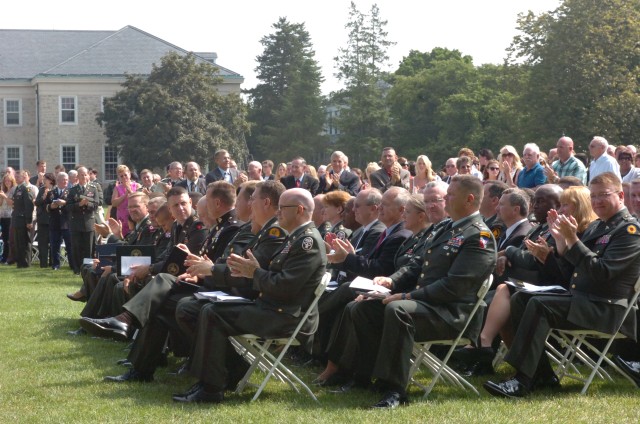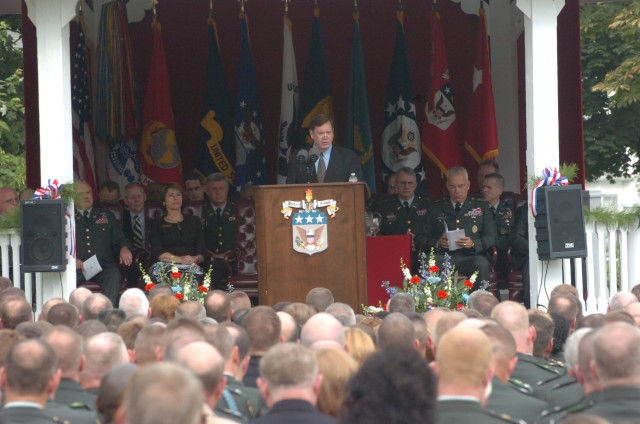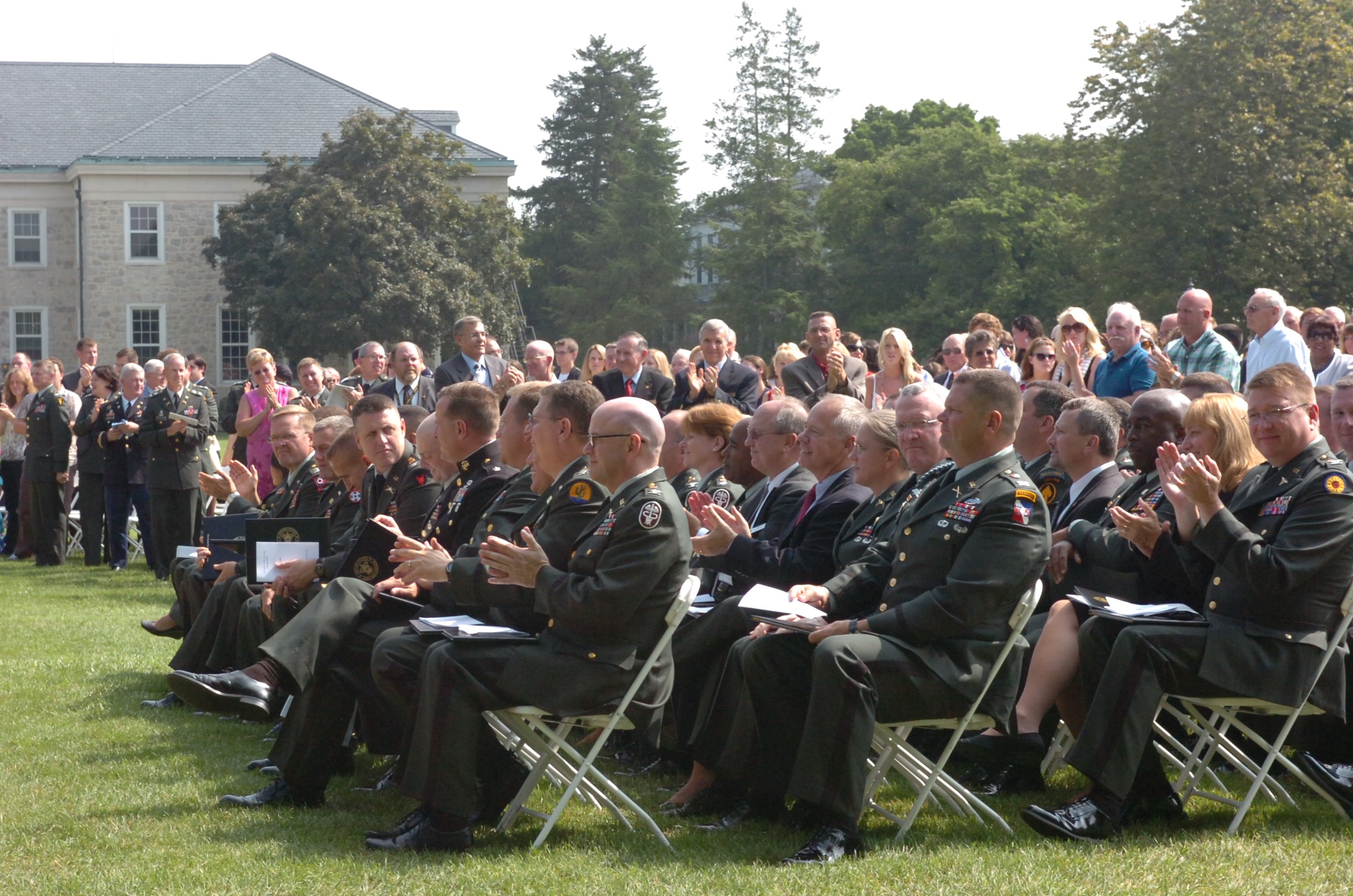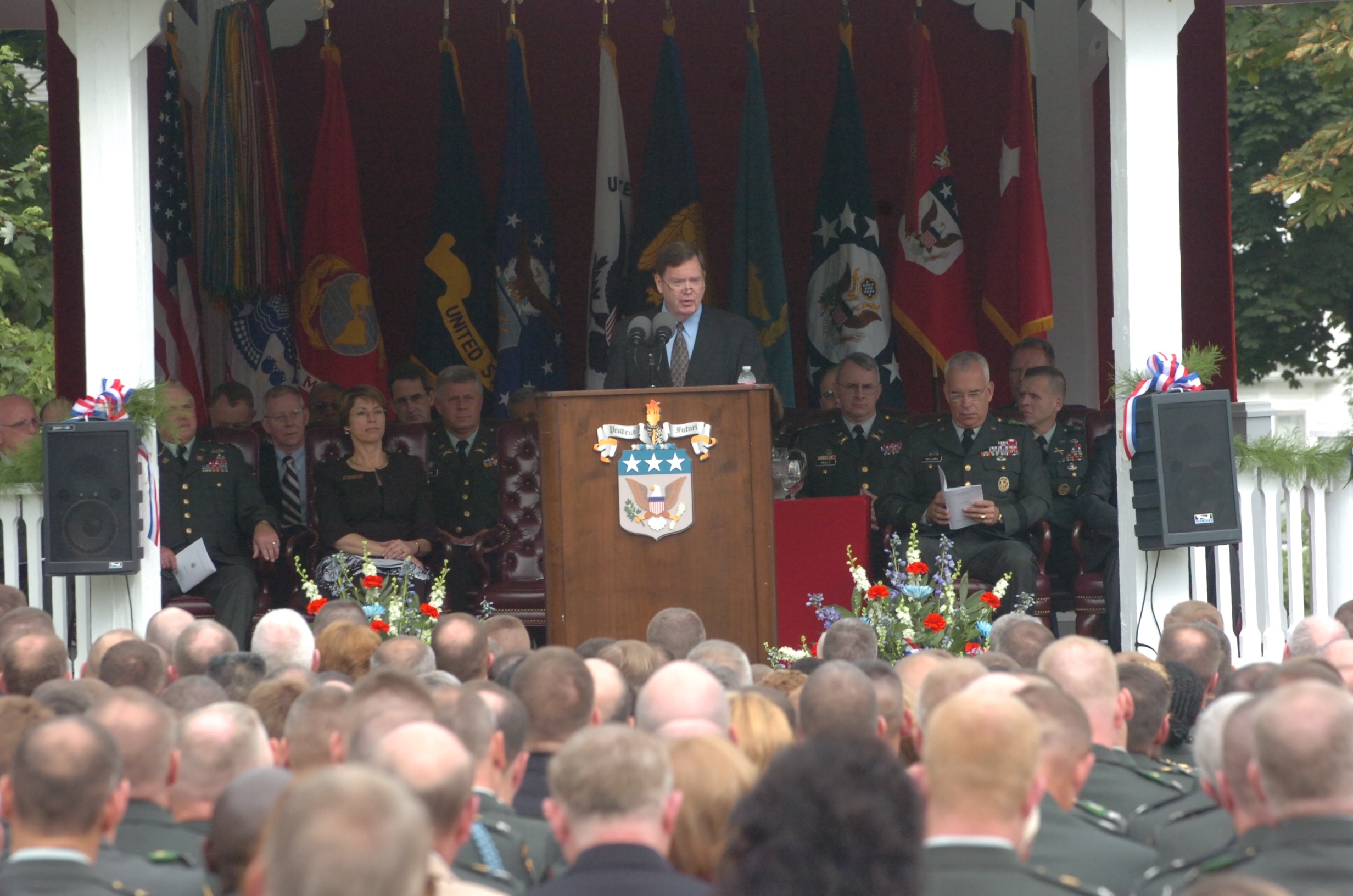The Army War College graduated 302 students of the distance education program at the historic Carlisle Barracks parade ground.
"It has been a challenge, for sure, but you should be proud for what you have done here," said Commandant Maj. Gen. Robert Williams, to the graduates. "You possess the necessary experience and education to serve in the important positions you will in the days ahead," he said, referring to their two years of internet-based studies with two USAWC resident phases.
Graduation speaker Paul McHale, former U.S. Marine and U.S. Representative from Pa. district 15, was most recently the Assistant Secretary of Defense for Homeland Defense.
McHale focused his remarks on current operations in Iraq and Afghanistan, the increased role of the National Guard in worldwide military missions, and the primary mission of homeland defense.
"Two-thirds of the graduates today came from the Reserve Components," said McHale, who noted that we could not have conducted military operations during the past eight years without the Reserve component, and we could not begin to respond to disasters in the United States without the National Guard.
"Domestic security requires the best and most dedicated effort," said McHale. "It is the paramount mission of the Department of Defense and this is a golden age for the National Guard.
"During no period of our nation's history have you been more important."
Using the language of the military, he described Iraq as an 'orderly retrograde;' he urged that Afghanistan be conducted as a classic 'battle handoff' to the Afghan people; and confirmed that U.S. homeland defense is the military's 'main effort.'
McHale urged that enhanced security and literacy education should go hand-in-hand in Afghanistan.
"Bringing literacy to the Afghan people is the greatest accomplishment possible," he said. "The provincial reconstruction teams are helping them achieve this goal."
McHale closed his remarks by thanking the students for their service.
"The finest men and women I have ever encountered serve in the U.S. military," he said. "We have literally placed our freedom in your hands and, frankly, that makes me feel pretty good.
"Congratulations on your accomplishment."
Pennsylvania Guard
Three officers of the 28th Infantry Division, Pa. Army National Guard, were among the graduates, as was Lt. Col. Egidjus Karvelis of Lithuania, which is a partner nation with the Pennsylvania Guard partnership program.
"It was very challenging but it was a rewarding experience," said Col. Michael Konzman. "The course was able to provide me a great deal of insight into the development and implementation of national power, which is an area I had no prior knowledge of." Konzman is the deputy commander of the 55th Brigade Combat Team.
"It was demanding but I learned so much that could help me where I am today or where I will be in the future" said Col. James Chisholm. "It's not focused solely on the military standpoint but on all of the pillars of strategy in national defense. It gives a strategic perspective that was not seen in the past. It's a very enlightening program."
Chisholm reflected his fellow officers' pride.
"I feel it was an honor to be a part of this. Being selected was an honor in itself. I get to walk through the school that some of the world's premier generals did." He is the G3 operations officer for the Pa. National Guard and manages planning for troop deployment.
"I was very impressed at how they pulled together so many aspects and brought them together to make sense," said Lt. Col. John Saufley. "This will certainly make an impact on my career and life as I move through the Army, and well after I retire.
"I never expected to come here. I did my cadet fitness training here in 1979. I think, being from Pennsylvania, I have a better understanding of the importance of Carlisle. It's very special to have had the opportunity to have come here." Chief engineer with the 28th Infantry Division, Saufley manages military construction across the state: currently one of the largest projects in the history of the National Guard.
Two graduates have USAWC ties
Two graduates will apply their experience directly back into organizations at the Army War College. Lt. Col. Scott Rainey, deputy director of the Strategic Experiential Education Group, and Dr. Larry Miller, director of the USAWC Communicative Arts program, both completed the program, albeit in different ways.
Rainey began the program as a member of the distance Class of 2008, but a deployment to Iraq caused him to delay his second resident course until this year.
"It was a very challenging and rigorous course, but the faculty is extremely helpful and is always there to help," he said.
Miller expects to be better able to communicate with USAWC students of both the resident and distance education courses.
"The course really helped me understand the issues and challenges they face in today's environment," he said. "The course almost created a bridge for me, being a civilian. I see more clearly now exactly what the students are experiencing."
Other students also reflected pride in their accomplishments and about the program.
"It's very strenuous. It's very hard but very rewarding," said Col. Duane Coffey.
"I enjoyed it," said Col. John Baranowski. "It has been a challenge, as it should be,"
"It's very constructive and demanding of your time. I think there is more learning done in the distance program than in the resident course," said Lt. Col. Cesar Padilla.
Strategy Implementation Seminar brings together USAWC students, civilians
The two-year curriculum ends with the second resident phase, highlighted by seminar dialogue, elective courses, and guest speakers.
The second resident course incorporates the Strategy Implementation Seminar, which brings 80 guests into Army War College seminars to discuss global and domestic issues with students.
"This seminar offers the civilian guests an opportunity to see how military leaders make decisions at the strategic level," said Col. Zak Grogan, second resident course director. "It also allows the students to share ideas with the civilian guests to help frame their decisions."
The keynote address for SIS was given by Robert Lentz, deputy assistant secretary of defense for Information and Identity Assurance.
"Cyber security is of the magnitude of a problem that we haven't faced for more than 60 years," he said. "It is something we all have to take seriously. You are all going to be in the middle of this." Lentz described the government's efforts in protection information systems as well as the need to add personnel in cyber-security positions.
A media panel brought together reports from national and international outlets to discuss coverage of military operations and how the media and military could work better together.
"Developing relationships really helps, especially if you are dealing with negative news," said Gordon Lubold, Christian Science Monitor. "We need to work closer together so we can help each other do our jobs better."
SIS guests found the seminar mutually productive.
"I think it's a good program. I can't say I'm surprised by the level of knowledge and experience of the students and the speakers. It's been beneficial from a civilian's standpoint and I hope it has been for them as well," said Paul Schemel.
"It's great. It's very thought provoking," said Laura Campbell. "The speakers are interesting and varied. And the seminar discussions are lively."
NORTHCOM Commander delivers keynote
Other speakers during the two-week resident course added to the student experience.
Air Force Gen. Gene Renuart, commander of North American Aerospace Defense Command and United States Northern Command, delivered the course keynote address July 13. He advised the students about leadership, relationships, and the type of issues that they will all deal with in the future.
"This is probably the most important part of this class," the 1992 USAWC graduate said about the resident phase. "It's true when they say that the relationships you develop here are crucial in your future.
"Someday soon you may find yourselves walk the streets of New Orleans, Galveston or California helping to respond to a natural disaster," he said. "You will form bonds now that will pay off down the line."
"You will all be responsible for shaping our future."
Guard, reserve issues focus
The majority of students in the distance education are officers from the Guard and Reserve so the challenges facing those services received attention during their resident phase.
Lt. Gen. Jack C. Stultz, Army Reserve Chief, discussed the issues and challenges facing the Army Reserve.
"It's a very busy time for the Guard and Reserve," said Stultz. "In the midst of everything going on we're still trying to transform the Reserve to an operational force." He highlighted how the structures and organization of units may change in the coming years to meet the needs of the Army.
"We're about 80 percent to where we want to be but we still have a lot of work ahead of us," he said. "It's not about a wire diagram, it's about taking care of and making sure people are in the right place."
Maj. Gen. Grant Hayden, commander of the 29th Infantry Division and special assistant to the Director, Army National Guard, focused on the need to balance the Guard when he spoke to the student body.
"Since 9/11 we've supported an unprecedented number of operations," he said. "We need to reorganize to be more versatile and agile but still be available for the homeland needs of our nation. We need to maintain our existing conventional and strategic technological edge. We can do so by institutionalizing some of our best programs across the Guard." He pointed out the counterinsurgency and international coordination capabilities of the Guard as these types of programs.
Other speakers included Maj. Gen. Michael Tucker, deputy chief of staff for Operations for the International Security Assistance Force in Afghanistan; Chuck de Caro, former CNN special assignment correspondent; and Dr. Montgomery McFate, Senior Social Science Advisor for the Army Human Terrain System Program.
Technology bridges the gap for distance students
The distance program is a two-year internet-based curriculum through which the students earn a master's degree of Strategic Studies.
"The students now use the skills they've acquired during their careers and during the first year of the course to help them make the important decisions at the strategic level," said Brewer.
Students also write graduate-level papers based on research into a topic that relates to leadership, strategy, national security affairs, military operations at strategic level of war, international relations or the role of politics and economics.




Social Sharing